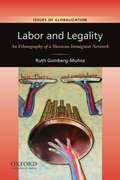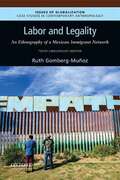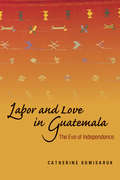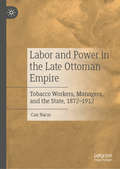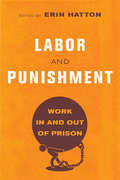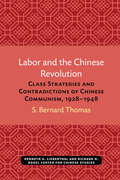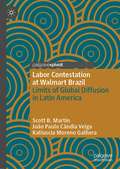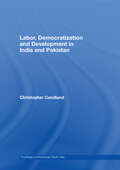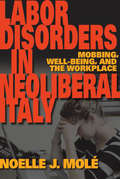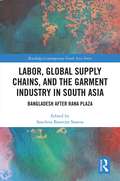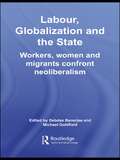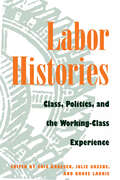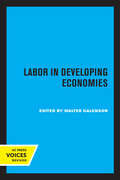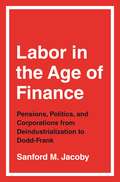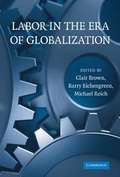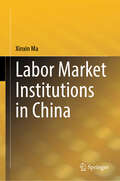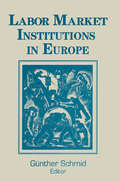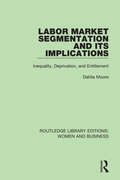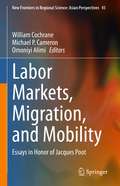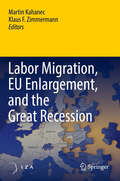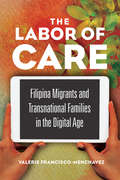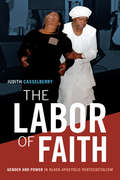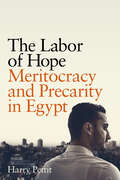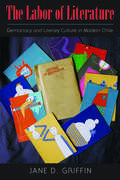- Table View
- List View
Labor And Legality: An Ethnography Of A Mexican Immigrant Network (Case Studies In Contemporary Anthropology Series)
by Ruth Gomberg-Muñoz<P>Labor and Legality: An Ethnography of a Mexican Immigrant Network is an ethnography of undocumented immigrants who work as busboys at a Chicago-area restaurant. <P>Ruth Gomberg-Muñoz introduces readers to the Lions, ten friends from Mexico committed to improving their fortunes and the lives of their families. <P>Set in and around "Il Vino," a restaurant that could stand in for many places that employ undocumented workers, Labor and Legality reveals the faces behind the war being waged over "illegal aliens" in America. <P>Gomberg-Muñoz focuses on how undocumented workers develop a wide range of social strategies to cultivate financial security, nurture emotional well-being, and promote their dignity and self-esteem. <P>She also reviews the political and historical circumstances of undocumented migration, with an emphasis on post-1970 socioeconomic and political conditions in the United States and Mexico.
Labor and Legality: An Ethnography of a Mexican Immigrant Network, 10th Anniversary Edition (Issues of Globalization:Case Studies in Contemporary Anthropology)
by Ruth Gomberg-MuñozLabor and Legality: An Ethnography of a Mexican Immigrant Network, Tenth Anniversary Edition, is an ethnography of undocumented immigrants who work as busboys at a Chicago-area restaurant. Ruth Gomberg-Muñoz introduces readers to the Lions, ten friends from Mexico committed to improving their fortunes and the lives of their families. Set in and around "Il Vino," a restaurant that could stand in for many places that employ undocumented workers, The Tenth Anniversary Edition of Labor and Legality reveals the faces behind the war being waged over "illegal immigrants" in America. Gomberg-Muñoz focuses on how undocumented workers develop a wide range of social strategies to cultivate financial security, nurture emotional well-being, and promote their dignity and self-esteem. She also reviews the political and historical circumstances of undocumented migration, with an emphasis on post-1970 socioeconomic and political conditions in the United States and Mexico. <P><P>Labor and Legality, Tenth Anniversary Edition, is one of many volumes in the series ISSUES OF GLOBALIZATION: CASE STUDIES IN CONTEMPORARY ANTHROPOLOGY, which introduces key concepts and theories of globalization through rich and compelling ethnography. It offers new research through case studies in a style and format appropriate for both students and scholars of Anthropology and related fields. Each volume offers a brief and engaging exploration of a particular issue arising from globalization and its cultural, political, and economic effects on certain peoples or groups.
Labor and Love in Guatemala: The Eve of Independence
by Catherine KomisarukLabor and Love in Guatemalare-envisions the histories of labor and ethnic formation in Spanish America. Taking cues from gender studies and the "new" cultural history, the book transforms perspectives on the major social trends that emerged across Spain's American colonies: populations from three continents mingled; native people and Africans became increasingly hispanized; slavery and other forms of labor coercion receded. Komisaruk's analysis shows how these developments were rooted in gendered structures of work, migration, family, and reproduction. The engrossing narrative reconstructs Afro-Guatemalan family histories through slavery and freedom, and tells stories of native working women and men based on their own words. The book takes us into the heart of sweeping historical processes as it depicts the migrations that linked countryside to city, the sweat and filth of domestic labor, the rise of female-headed households, and love as it was actually practiced—amidst remarkable permissiveness by both individuals and the state.
Labor and Power in the Late Ottoman Empire: Tobacco Workers, Managers, and the State, 1872–1912
by Can NacarBy the early twentieth century, consumers around the world had developed a taste for Ottoman-grown tobacco. Employing tens of thousands of workers, the Ottoman tobacco industry flourished in the decades between the 1870s to the First Balkan War—and it became the locus of many of the most active labor struggles across the empire. Can Nacar delves into the lives of these workers and their fight for better working conditions. Full of insight into the changing relations of power between capital and labor in the Ottoman Empire and the role played by state actors in these relations, this book also draws on a rich array of primary sources to foreground the voices of tobacco workers themselves.
Labor and Punishment: Work in and out of Prison
by Erin HattonThe insightful chapters in this volume reveal the multiple and multifaceted intersections between mass incarceration and neoliberal precarity. Both mass incarceration and the criminal justice system are profoundly implicated in the production and reproduction of the low-wage "exploitable" precariat, both within and beyond prison walls. The carceral state is a regime of labor discipline—and a growing one—that extends far beyond its own inmate labor. This regime not only molds inmates into compliant workers willing and expected to accept any "bad" job upon release but also compels many Americans to work in such jobs under threat of incarceration, all the while bolstering their "exploitability" and socioeconomic marginality. Contributors include Anne Bonds, Philip Goodman, Amanda Bell Hughett, Caroline M. Parker, Gretchen Purser, Jacqueline Stevens, and Noah D. Zatz.
Labor and the Chinese Revolution: Class Strategies and Contradictions of Chinese Communism, 1928–1948 (Michigan Monographs In Chinese Studies #49)
by S. Bernard ThomasIn the two-decade period from 1928 to 1948, the proletarian themes and issues underlying the Chinese Communist Party’s ideological utterances were shrouded in rhetoric designed, perhaps, as much to disguise as to chart actual class strategies. Rhetoric notwithstanding, a careful analysis of such pronouncements is vitally important in following and evaluating the party’s changing lines during this key revolutionary period. The function of the “proletariat” in the complex of policy issues and leadership struggles which developed under the precarious circumstances of those years had an importance out of all proportion to labor’s relatively minor role in the post-1927 Communist led revolution. [1, 2]
Labor and the Class Idea in the United States and Canada (Cambridge Studies In Contentious Politics )
by Barry EidlinWhy are unions weaker in the US than in Canada, two otherwise similar countries? <P><P>This difference has shaped politics, policy, and levels of inequality. Conventional wisdom points to differences in political cultures, party systems, and labor laws. But Barry Eidlin's systematic analysis of archival and statistical data shows the limits of conventional wisdom, and presents a novel explanation for the cross-border difference. <P>He shows that it resulted from different ruling party responses to worker upsurge during the Great Depression and World War II. Paradoxically, US labor's long-term decline resulted from what was initially a more pro-labor ruling party response, while Canadian labor's relative long-term strength resulted from a more hostile ruling party response. These struggles embedded 'the class idea' more deeply in policies, institutions, and practices than in the US. In an age of growing economic inequality and broken systems of political representation, Eidlin's analysis offers insight for those seeking to understand these trends, as well as those seeking to change them.<P> Provides a novel theory of American exceptionalism.<P> Presents the most comprehensive and systematic assessment ever of explanations for US union decline.<P> Written in an accessible style, with carefully explained graphs using only descriptive statistics.
Labor Contestation at Walmart Brazil: Limits of Global Diffusion in Latin America (Governance, Development, and Social Inclusion in Latin America)
by Scott B. Martin João Paulo Veiga Katiuscia Moreno GalheraThis book explores how and why the labor practices of the world’s largest employer, supermarket giant Walmart, were contested by unions and government regulators as it expanded to Latin America starting in the 1990s. With an in-depth case study of Brazil, and a comparative chapter examining Argentina, Chile, and Mexico, this book analyzes the problematic encounter between diffusion of home-office anti-labor practices and evolving national institutional contexts that are quite varied and in some cases enable considerable resistance by unions and/or regulators. Walmart’s “repressive familial” and “anti-union” model is found to generate costs and conflicts that contributed to its unprofitability and ultimate exit from Brazil in 2018. This experience, contrasted with country situations where Walmart’s overall competitive and labor and human resource practices “fit” better with national markets and institutions, underlines the brittle, problematic nature of diffusionist corporate models lacking adaptive capacity to significant cross-national variations across host countries.
Labor, Democratization and Development in India and Pakistan (Routledge Contemporary South Asia Series)
by Christopher CandlandIn this first comparative study of organized labor in India and Pakistan, the author analyses the impact and role of organized labor in democratization and development. The study provides a unique comparative history of Indian and Pakistani labor politics. It begins in the early twentieth century, when permanent unions first formed in the South Asian Subcontinent. Additionally, it offers an analysis of changes in conditions of work andterms of service in India and Pakistan and of organized labor’s response. The conclusions shed new light on the influence of organized labor in national politics, economic policy, economic welfare and at the workplace. It is demonstrated that the protection of workers has desirable outcomes not only for those workers covered but also for democratic practice and for economic development.
Labor Disorders in Neoliberal Italy
by Noelle J. MoléPsychological harassment at work, or "mobbing," has become a significant public policy issue in Italy and elsewhere in Europe. Mobbing has given rise to specialized counseling clinics, a new field of professional expertise, and new labor laws. For Noelle J. Molé, mobbing is a manifestation of Italy's rapid transition from a highly protectionist to a market-oriented labor regime and a neoliberal state. She analyzes the classification of mobbing as a work-related illness, the deployment of preventive public health programs, the relation of mobbing to gendered work practices, and workers' use of the concept of mobbing to make legal and medical claims, with implications for state policy, labor contracts, and political movements. For many Italian workers, mobbing embodies the social and psychological effects of an economy and a state in transition.
Labor, Global Supply Chains and the Garment Industry in South Asia: Bangladesh after Rana Plaza (Routledge Contemporary South Asia Series)
by Sanchita Banerjee SaxenaThis book argues that larger flaws in the global supply chain must first be addressed to change the way business is conducted to prevent factory owners from taking deadly risks to meet clients’ demands in the garment industry in Bangladesh. Using the 2013 Rana Plaza disaster as a departure point, and to prevent such tragedies from occurring in the future, this book presents an interdisciplinary analysis to address the disaster which resulted in a radical change in the functioning of the garment industry. The chapters present innovative ways of thinking about solutions that go beyond third-party monitoring. They open up possibilities for a renewed engagement of international brands and buyers within the garment sector, a focus on direct worker empowerment using technology, the role of community-based movements, developing a model of change through enforceable contracts combined with workers movements, and a more productive and influential role for both factory owners and the government. This book makes key interventions and rethinks the approaches that have been taken until now and proposes suggestions for the way forward. It engages with international brands, the private sector, and civil society to strategize about the future of the industry and for those who depend on it for their livelihood. A much-needed review and evaluation of the many initiatives that have been set up in Bangladesh in the wake of Rana Plaza, this book is a valuable addition to academics in the fields of development studies, gender and women’s studies, human rights, poverty and practice, political science, economics, sociology, anthropology, and South Asian studies.
Labor, Globalization and the State: Workers, Women and Migrants Confront Neoliberalism (Routledge Contemporary South Asia Series #Vol. 5)
by Debdas Banerjee Michael GoldfieldThis book explores the impact of neoliberal globalization on labour markets and the state in the developed and developing world. It focuses especially on the United States and the economies of Asia – in particular, India. Liberalized trade and investment are thought by neoliberals to be the best levers for raising labour standards, provided labour market flexibility and capital market restructuring accompany them. Labour market flexibility and capital market restructuring, at a first glance, appear to be complementary and symmetric policies. In practice, however, they might have very asymmetric consequences. This book addresses these issues, and it presents a comprehensive analysis of the key questions such as: How far is globalization a ‘real’ threat to the conventional systems of wage fixation, employment pattern, and basic rights at work in both developed, as well as underdeveloped countries? Are casualization and informalization of the workforce direct outcomes of deregulation? How do labour organizations cope with the volatility of the labour market? Are the existing labour market conditions and forms of labour organizations misfits in the globalized business world? Is it at all feasible to choose a high road that combines some degree of labour market flexibility with better labour standards? This book will be of interest to academics working on International Development, Development Economics, Political Economy, Comparative Labour Studies and Asian Studies.
Labor Histories: Class, Politics, and the Working-Class Experience (Working Class in American History)
by Reeve Huston Bruce Laurie Shelton Stromquist Cecelia Bucki Tera W. Hunter Gunther Peck Kathryn J Oberdeck Kimberley L. Phillips Ileen A DeVault James R. Barrett Peter RachleffIs class outmoded as a basis for understanding labor history? This collection emphatically answers, "No!" These thirteen essays delve into subjects like migrant labor, religion, ethnicity, agricultural history, and gender. Written by former students of preeminent labor figure and historian David Montgomery, the works advance the argument that class remains indispensable to the study of working Americans and their place in the broad drama of our shared national history.
Labor in Developing Economies
by Walter GalensonThis title is part of UC Press's Voices Revived program, which commemorates University of California Press’s mission to seek out and cultivate the brightest minds and give them voice, reach, and impact. Drawing on a backlist dating to 1893, Voices Revived makes high-quality, peer-reviewed scholarship accessible once again using print-on-demand technology. This title was originally published in 1962.
Labor in the Age of Finance: Pensions, Politics, and Corporations from Deindustrialization to Dodd-Frank
by Sanford M. JacobyFrom award-winning economic historian Sanford M. Jacoby, a fascinating and important study of the labor movement and shareholder capitalismSince the 1970s, American unions have shrunk dramatically, as has their economic clout. Labor in the Age of Finance traces the search for new sources of power, showing how unions turned financialization to their advantage.Sanford Jacoby catalogs the array of allies and finance-based tactics labor deployed to stanch membership losses in the private sector. By leveraging pension capital, unions restructured corporate governance around issues like executive pay and accountability. In Congress, they drew on their political influence to press for corporate reforms in the wake of business scandals and the financial crisis. The effort restrained imperial CEOs but could not bridge the divide between workers and owners. Wages lagged behind investor returns, feeding the inequality identified by Occupy Wall Street. And labor’s slide continued.A compelling blend of history, economics, and politics, Labor in the Age of Finance explores the paradox of capital bestowing power to labor in the tumultuous era of Enron, Lehman Brothers, and Dodd-Frank.
Labor in the Era of Globalization
by Clair Brown Barry Eichengreen Michael ReichThe third quarter of the twentieth century was a golden age for labor in the advanced industrial countries, characterized by rising incomes, relatively egalitarian wage structures, and reasonable levels of job security. The subsequent quarter-century has seen less positive performance along a number of these dimensions. This period has instead been marked by rapid globalization of economic activity that has brought increased insecurity to workers. The contributors to this volume, prominent scholars from the United States, Europe, and Japan, distinguish four explanations for this historic shift. These include 1) rapid development of new technologies; 2) global competition for both business and labor; 3) deregulation of industry with more reliance on markets; and 4) increased immigration of workers, especially unskilled workers, from developing countries. In addition to analyzing the causes of these trends, the contributors also investigate important consequences, ranging from changes in collective bargaining and employment relations to family formation decisions and incarceration policy.
Labor Market Institutions in China
by Xinxin MaThis book examines labor market policy and institutional reforms and their impact on outcomes in the Chinese labor market, utilizing both institutional and empirical study perspectives. It furnishes readers with academic evidence essential for comprehending the transformation of labor policies and institutions within the Chinese context—an emerging market economy housing one of the largest workforces globally. The main content of this book is divided into two parts: (i) Social institutions and labor market policies, encompassing topics such as trade unions and union wage premiums, minimum wage regulations and wage distributions, labor contracts, employment security and the high education expansion policy. (ii) Wage and employment institutions in the workplace, including areas such as seniority wages, mandatory retirement systems, the wage-experience profile, the dual labor market phenomenon, discrimination against women and minority ethnic workers, work hours, work-family conflict, job satisfaction, and the influences of Communist Party of China membership on managerial promotions. This book presents academic evidence on these issues, grounded in institutional transition background, economic theories, and empirical studies. It draws upon various Chinese nationwide representative survey datasets. This book is highly recommended for readers interested in institutional transitions, seeking up-to-date and in-depth empirical studies on the associations between labor policies/institutions and labor market outcomes. It particularly appeals to those with an interest in the Chinese economy, labor policymakers, scholars with a background in econometric analysis, and managers in companies.
Labor Market Institutions in Europe: A Socioeconomic Evaluation of Performance
by Gunther SchmidThe outcome of three years of research on the role of institutions in labor markets at the research unit Labor Market Policy and Employment of the Social Science Research Center Berlin, these seven contributions were originally presented at a conference in December 1992 before a group of experts i
Labor Market Segmentation and its Implications: Inequality, Deprivation, and Entitlement (Routledge Library Editions: Women and Business #3)
by Dahlia MooreOccupational sex segregation is one of the most universal and salient characteristics of labor markets. It indicates the different probabilities of members of both genders to take up particular occupations, and traditionally places women at a great disadvantage. This book, first published in 1992, focuses on a comparative analysis of sex-segregated occupational categories and attempts to systematically examine their implications. Since very little is known about Israeli working women, and given the cultural differences between Israel and other, more studied industrialised nations, this book focuses on the Israeli labor market. Through the utilization of several theoretical approaches, combining economic, sociological, and social-psychological perspectives, the book analyses empirical findings concerning labor market perceptions, attitudes and behaviors.
Labor Markets, Migration, and Mobility: Essays in Honor of Jacques Poot (New Frontiers in Regional Science: Asian Perspectives #45)
by William Cochrane Michael P. Cameron Omoniyi AlimiThis volume is devoted to three key themes central to studies in regional science: the sub-national labor market, migration, and mobility, and their analysis. The book brings together essays that cover a wide range of topics including the development of uncertainty in national and subnational population projections; the impacts of widening and deepening human capital; the relationship between migration, neighborhood change, and area-based urban policy; the facilitating role played by outmigration and remittances in economic transition; and the contrasting importance of quality of life and quality of business for domestic and international migrants. All of the contributions here are by leading figures in their fields and employ state-of-the art methodologies. Given the variety of topics and themes covered this book, it will appeal to a broad range of readers interested in both regional science and related disciplines such as demography, population economics, and public policy.
Labor Migration, EU Enlargement, and the Great Recession
by Martin Kahanec Klaus F. ZimmermannThis volume extends and deepens our knowledge about cross-border mobility and its role in an enlarged EU. More specifically, its main purpose is to enlighten the growing and yet rather uninformed debate about the role of post-enlargement migration for economic adjustment in the crisis-stricken labor markets of the Eurozone and the EU as a whole. The book addresses the political economy aspects of post-enlargement migration, including its broader political contexts, redistributive impacts, but also nationalization of the enlargement agenda. It also covers the experience of receiving and sending countries with post-enlargement migration and its role during the current crisis. Renowned experts in the field study, whether and how post-enlargement mobility has enabled the EU to absorb asymmetric economic shocks, how it has affected the European welfare systems, and whether it has contributed to the sustainability of the Eurozone. The authors also evaluate brain circulation as a sought-after vehicle of improved allocative efficiency of EU labor markets and propose a policy agenda for mobility in an enlarged EU.
The Labor of Care: Filipina Migrants and Transnational Families in the Digital Age (Asian American Experience #124)
by Valerie Francisco-MenchavezFor generations, migration moved in one direction at a time: migrants to host countries, and money to families left behind. <P><P>The Labor of Care argues that globalization has changed all that. Valerie Francisco-Menchavez spent five years alongside a group of working migrant mothers. Drawing on interviews and up-close collaboration with these women, Francisco-Menchavez looks at the sacrifices, emotional and material consequences, and recasting of roles that emerge from family separation. <P>She pays particular attention to how technologies like Facebook, Skype, and recorded video open up transformative ways of bridging distances while still supporting traditional family dynamics. As she shows, migrants also build communities of care in their host countries. <P>These chosen families provide an essential form of mutual support. What emerges is a fascinating portrait of today's transnational family—sundered, yet inexorably linked over the distances by timeless emotions and new forms of intimacy.
The Labor of Faith: Gender and Power in Black Apostolic Pentecostalism
by Judith CasselberryIn The Labor of Faith Judith Casselberry examines the material and spiritual labor of the women of the Church of Our Lord Jesus Christ of the Apostolic Faith, Inc., which is based in Harlem and one of the oldest and largest historically Black Pentecostal denominations in the United States. This male-headed church only functions through the work of the church's women, who, despite making up three-quarters of its adult membership, hold no formal positions of power. Casselberry shows how the women negotiate this contradiction by using their work to produce and claim a spiritual authority that provides them with a particular form of power. She also emphasizes how their work in the church is as significant, labor intensive, and critical to their personhood, family, and community as their careers, home and family work, and community service are. Focusing on the circumstances of producing a holy black female personhood, Casselberry reveals the ways twenty-first-century women's spiritual power operates and resonates with meaning in Pentecostal, female-majority, male-led churches.
The Labor of Hope: Meritocracy and Precarity in Egypt
by Harry PettitTechnological advancements, expanding education, and unfettered capitalism have encouraged many around the world to aspire to better lives, even as declines in employment and widening inequality are pushing more and more people into insecurity and hardship. In Egypt, a generation of young men desire fulfilling employment, meaningful relationships, and secure family life, yet find few paths to achieve this. The Labor of Hope follows these educated but underemployed men as they struggle to establish careers and build satisfying lives. In so doing, this book reveals the lived contradiction at the heart of capitalist systems—the expansive dreams they encourage and the precarious lives they produce. Harry Pettit follows young men as they engage a booming training, recruitment, and entrepreneurship industry that sells the cruel meritocratic promise that a good life is realizable for all. He considers the various ways individuals cultivate distraction and hope for future mobility: education, migration, consumption, and prayer. These hope-filled practices are a form of emotional labor for young men, placing responsibility on the individual rather than structural issues in Egypt's economy. Illuminating this emotional labor, Pettit shows how the capitalist economy continues to capture the attention of the very people harmed by it.
The Labor of Literature: Democracy and Literary Culture in Modern Chile
by Jane D. GriffinBy producing literature in nontraditional forms—books made of cardboard trash, posters in subway stations, miniature shopping bags, digital publications, and even children’s toys—Chileans have made and circulated literary objects in defiance of state censorship and independent of capitalist definitions of value. In The Labor of Literature Jane D. Griffin studies amateur and noncommercial forms of literary production in Chile that originated in response to authoritarian state politics and have gained momentum throughout the postdictatorship period. She argues that such forms advance a model of cultural democracy that differs from and sometimes contradicts the model endorsed by the state and the market. By examining alternative literary publications, Griffin recasts the seventeen-year Pinochet dictatorship as a time of editorial experimentation despite widespread cultural oppression and shows how grassroots cultural activism has challenged government-approved corporate publishing models throughout the postdictatorship period. Griffin’s work also points to the growing importance of autogestión, or do-it-yourself cultural production, where individuals combine artisanal forms with new technologies to make and share creative work on a global scale.
